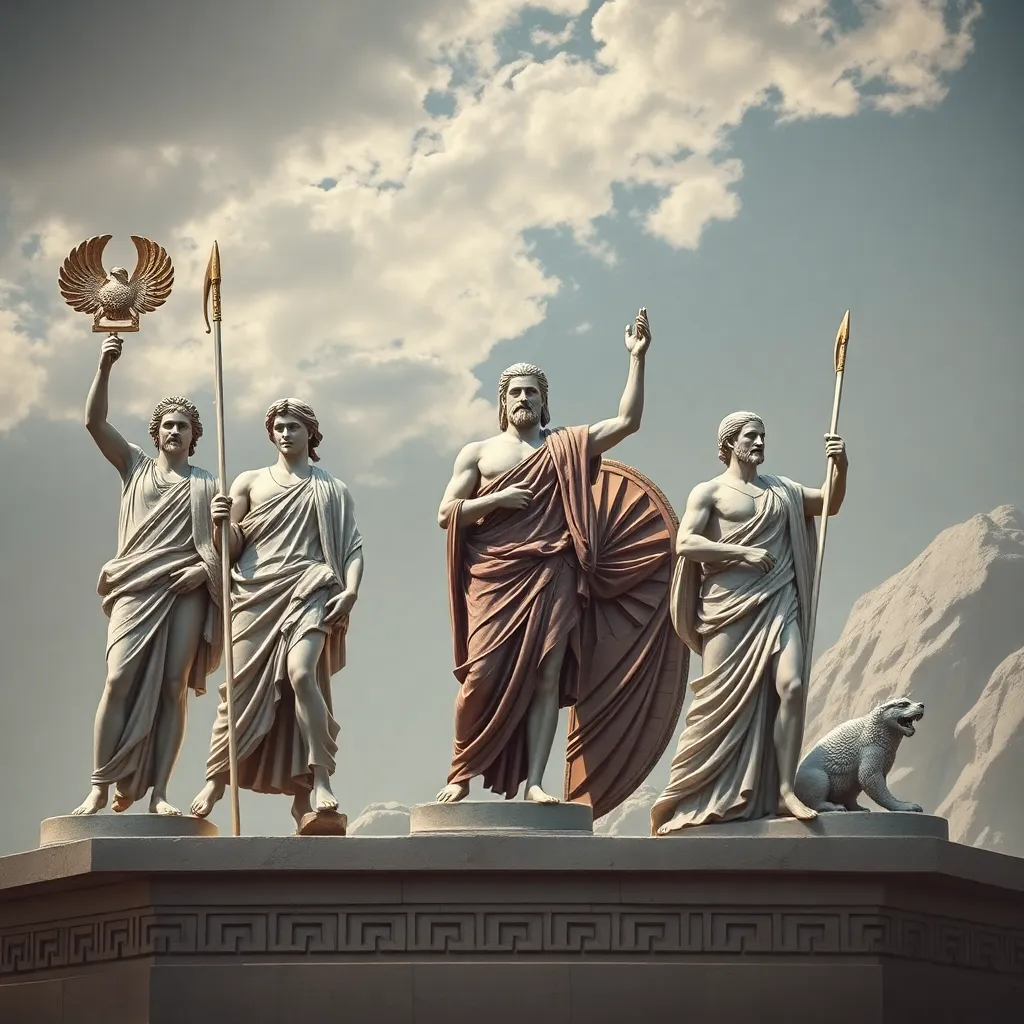The Olympians and Their Role in the Development of Greek Political Thought
I. Introduction
The Olympians are a pantheon of deities in Greek mythology, residing atop Mount Olympus. They are central figures in various myths, embodying both human-like characteristics and divine powers. These gods and goddesses played an integral role in the lives of ancient Greeks, influencing their culture, religion, and political structures.
Greek political thought, which emerged in the context of city-states and democratic governance, is significant for its exploration of justice, authority, citizenship, and the role of the individual in society. This article aims to explore how the Olympian deities influenced these political ideas and contributed to the development of Greek political thought.
II. The Olympians: An Overview
The Olympians consist of twelve major gods and goddesses, each with unique attributes and domains:
- Zeus: King of the gods, god of the sky and thunder.
- Hera: Queen of the gods, goddess of marriage and family.
- Poseidon: God of the sea and earthquakes.
- Athena: Goddess of wisdom, warfare, and strategy.
- Apollo: God of the sun, music, and prophecy.
- Artemis: Goddess of the hunt and wilderness.
- Aphrodite: Goddess of love and beauty.
- Ares: God of war.
- Demeter: Goddess of agriculture and fertility.
- Dionysus: God of wine, pleasure, and festivity.
- Hephaestus: God of fire and craftsmanship.
- Hermes: Messenger of the gods, god of commerce and thieves.
The cultural and religious context of these Olympians shaped various aspects of life in ancient Greece, especially in the realms of politics and ethics. They were worshipped through rituals, festivals, and sacrifices, reflecting the deep-seated belief in their influence over human affairs.
III. The Olympians and the Concept of Justice
Divine justice is a recurring theme in Greek mythology, often represented by the decisions and actions of the Olympian gods. For instance, Zeus, as the ultimate authority, is frequently depicted as the enforcer of justice, punishing hubris and rewarding virtue.
The relationship between the Olympians and human morality is complex. Myths illustrate how the gods interact with mortals, often serving as moral exemplars or cautionary figures. The stories of Prometheus and Pandora, for example, highlight themes of punishment and consequence tied to human actions.
These mythological portrayals influenced early philosophical concepts of justice, with thinkers like Plato and Aristotle drawing on themes from mythology to discuss ethical governance and the role of justice in society.
IV. The Olympians and Governance
In ancient Greek mythology, the concept of governance is often tied to divine authority. The Olympians are depicted as the ultimate rulers, with Zeus embodying the ideal of sovereign power. His authority is legitimized through various myths that showcase his ability to maintain order and dispense justice.
Case studies of Zeus illustrate his role as a symbol of kingship. For instance, his intervention in human affairs, such as the Trojan War, reflects the belief that divine favor is essential for legitimate political power. Rulers often claimed descent from or favor with the gods to strengthen their authority.
V. The Olympians and Civic Virtue
Myths involving the Olympians often promote civic responsibility and virtue, essential components of Greek citizenship. Stories that emphasize honor, bravery, and loyalty resonate with the ideals of the polis, encouraging citizens to contribute positively to their communities.
The impact of these myths on the development of citizenship ideals is significant. They instilled a sense of duty and ethical conduct, which philosophers like Plato and Aristotle later explored in their writings on virtue and the ideal citizen.
VI. The Olympians and Political Discourse
The use of mythological references in political rhetoric has a long history in ancient Greece. Politicians and public speakers often invoked the Olympians to legitimize their arguments, drawing parallels between their actions and the virtues exemplified by the gods.
The Olympians served as powerful symbols in public debates and assemblies. For instance, references to Athena’s wisdom or Ares’s bravery could enhance an orator’s appeal to civic values and collective identity.
Playwrights, too, utilized Olympian themes in their works, providing political commentary through the lens of myth. Tragedies and comedies often reflected the interplay between divine influence and human agency, shaping public perception of political issues.
VII. The Evolution of Political Thought Post-Olympians
As Greek thought evolved, there was a transition from mythological explanations of governance to more rational philosophical frameworks. The influence of the Olympians began to wane during the Hellenistic period, as philosophical inquiry took precedence over myth.
Despite this decline, the legacy of Olympian themes persisted in Western political philosophy. Concepts of justice, virtue, and civic responsibility rooted in mythology continued to inform political discourse for centuries.
VIII. Conclusion
In summary, the Olympians played a crucial role in shaping Greek political thought, influencing concepts of justice, governance, and civic virtue. Their stories and characteristics provided a framework for understanding authority and morality in the ancient world.
The enduring relevance of mythology in modern politics can be seen in how symbols and narratives continue to resonate within contemporary discourse. The intersection of religion and governance in ancient Greece offers valuable insights into the foundations of political thought that remain influential today.




